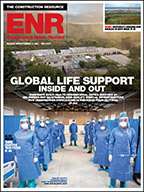An industry group that hopes to automate code compliance checks for 3-D building information models scaled back its proof-of-concept project recently because the process it hoped to measure against—manual 2-D plan review—turned out to be wildly erratic.
AutoCodes project committee member Bill Gould says the group had hoped to establish a baseline by submitting to code officials a 2-D set of 137 plan sheets for a big Target Corp. retail store prototype in 13 jurisdictions around the country. Review was to be limited to access and egress (A&E) compliance, which is governed by relatively objective criteria.
In the second step, automatic code-compliance software was to run the same review against the original 3-D model from which the 2-D plans were derived.
The committee expected a few variations, but members were shocked by the disparity found in the 2-D reviews before the 3-D model check was even run.
"In one jurisdiction with the plan set we got one response [issue flagged]. From another jurisdiction we got 43," says Gould. "We realized, wow! We have a real issue here with regard to consistency."
Several planned rounds of rule tweaks were dropped from the first phase of the project as the group assessed the findings.
Indeed, the jurisdiction that raised one question and the one with 43 issues were by no means outliers, Gould said. The numbers of issues flagged by the various jurisdictions varied widely and were scattered all between. "It definitely underscored the issue that we're trying to address," Gould says.
Committee members from Minneapolis-based Target Corp., which supplied the plans and model, were not permitted to comment for this article by Target's corporate communications department. But in representations to Fiatech, the company has complained that such erratic results during plan reviews have hamstrung efforts to build stores in many jurisdictions, and even within the same jurisdiction. They suggest that the problem causes unpredictable delays and drives up project costs and affects all designers and builders. It is a significant drag on the economy, nationwide, they claim.
"This is what they've been crying about," says Gould.
The industry technology consortium Fiatech, based in Austin, is co-sponsoring the AutoCodes project with the International Code Council, Chicago, Ill. The groups are circulating the report describing the first phase results.



Post a comment to this article
Report Abusive Comment